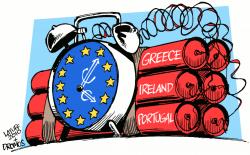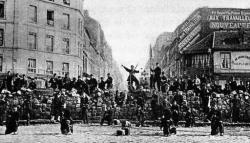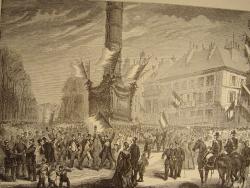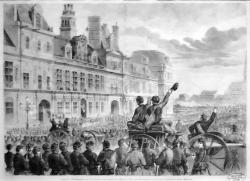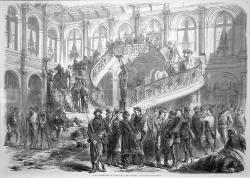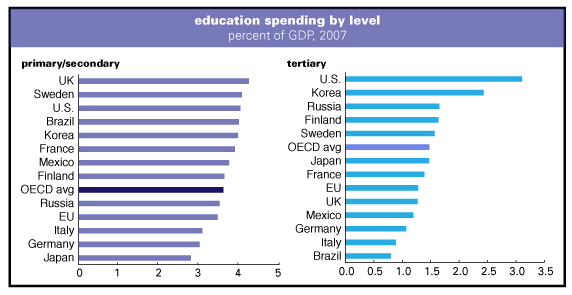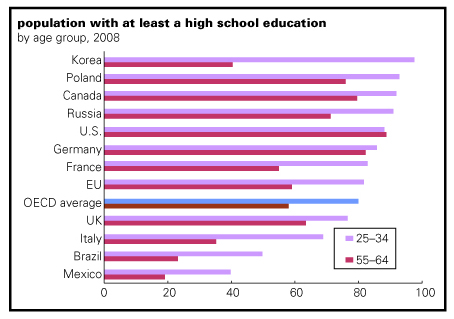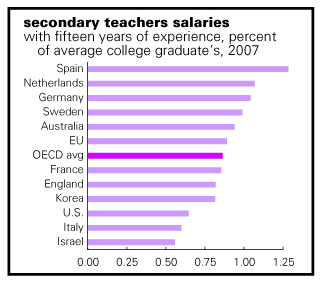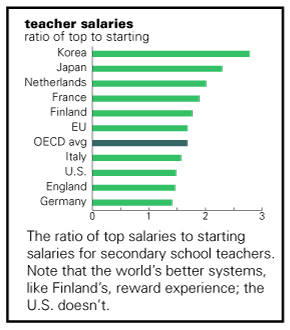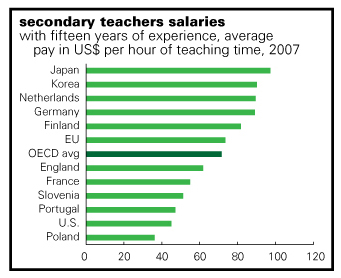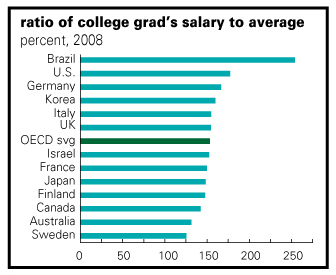
Ideology
Frankfurt Institute for Social Research
The concept of Ideology has gained universal acceptance in the language of science. "Only rarely today," Eduard Spranger wrote recently, "does one speak of political ideas and ideals, but very frequently of political ideologies." [1] Our knowledge incorporates intellectual formations into the social dynamics, by relating them to the underlying interconnections of motivation. The undeniable appearance of their independent existence [An‑sich‑Sein] as well as their presumptions to truth are made subject to critical insight. The independence of spiritual products and indeed even the conditions by which they gain this independence are conceived jointly with the real historical movement under the name of "ideology." Within it these products are produced and within it they exercise their function. Allegedly they serve particular interests, voluntarily or involuntarily. The separation itself and the constitution of its distinct sphere, the sphere of spirit, its transcendence, is at the same time defined as a social result of the division of labor. In its very form this transcendence is held to justify a fragmented society. To have a share in the eternal world of ideas is reserved for those who are privileged by exemption from physical labor. Themes of this kind, which resonate wherever there is talk of ideology, have set its concept and the sociology that deals with it in opposition to traditional philosophy. The latter still maintains, if not quite in the same words, that in contrast to the changing flux of appearances, it deals with permanent and unchanging essence. The statement of a German philosopher, who still exercises great authority, is well known: in the pre‑Fascist era he compared sociology to a cat‑burglar climbing the façade [of the philosophic edifice]. Such conceptions which have seeped into popular consciousness for a long time and have contributed essentially to the mistrust of sociology, require reflection, all the more so, because in them that which long since has become irreconcilable and at times crassly contradictory is intermixed. In rendering intellectual contents dynamic by means of the critique of ideology we have been led to forget that the doctrine of ideology itself belongs to the movement of history, and that even if the substance of the concept of ideology has not changed, its function has, and is subject to these dynamics. [2] What is called ideology, and what actually is ideology, can only be established if one does justice to the movement of the concept, which at the same time is the movement of the thing.
If one disregards those oppositional countercurrents in Greek philosophy which have fallen into disrepute due to the triumph of the Platonic‑Aristotelian tradition and which are being reconstructed with great difficulty only today, then, at least since the beginnings of modern bourgeois society at the turn of the sixteenth and the seventeenth centuries, the general conditions for false contents of consciousness began to be noted. Francis Bacon's antidogmatic manifesto for a liberation of reason proclaims the struggle against the "Idols," the collective prejudices which still oppressed mankind at the end of that age, just as they did in its beginnings. His formulations at times have the ring of an anticipation of the modern positivistic critique of language, of semantics. He characterizes one type of the idols, from which the human mind must free itself, as the Idols of the Market [idola fori], freely translated, the idols of mass society: “For it is by discourse that men associate; and words are imposed according to the apprehension of the vulgar. And therefore the ill and unfit choice of words wonderfully obstructs the understanding. . . . Words plainly force and override the understanding and throw all into confusion.” [13] Two aspects of this statement of the earliest modern Enlightenment deserve emphasis. First, the delusion is attributed to "men" thus, as it were, to invariant natural beings, and not to the conditions which make them what they are or to which they are subject, "the crowd." The doctrine of innate blindness, a part of secular theology, today still belongs to the arsenal of the vulgar doctrine of ideology: in attributing false consciousness to a fundamental property of human beings or to their sociation as such, not only are its concrete conditions ignored, but at the same time delusion is justified, as it were, as a law of nature, and the domination over the deluded is also justified by this, as indeed was done by Bacon's pupil Hobbes afterwards. Furthermore the delusion was attributed to "name-giving," to logical impurities, and thus to the subjects and their fallibility, rather than to the objective historical constellations, just as Theodor Geiger recently again explained ideologies purely as a matter of "mentality" and denounced their alleged relationship to the social structure as "pure mysticism." [4] Bacon's concept of ideology—if it is permissible to attribute this to him—is just as subjectivistic as the concept current today. While his doctrine of the idols sought to further the emancipation of bourgeois consciousness from the tutelage of the Church and, in this, is part of the progressive character of Baconian philosophy as a whole, the limitations of this bourgeois consciousness are already discernible in him: the intellectual perpetualization of conditions probably conceived according to the model of the states of Antiquity, which are to be emulated, and the abstract subjectivism, which has no intimation of the moment of falseness contained in the isolated category of the subject.
The politically progressive impulse of the critique of false consciousness which Bacon sketched out emerges much more definitely in the Enlightenment of the eighteenth century. Thus the left‑wing encyclopedists Helvetius and Holbach proclaim that prejudices of the sort which Bacon attributed to man universally have their definite social function. They serve the maintenance of unjust conditions and stand in opposition to the realization of happiness and the establishment of a rational society. "The prejudices of the great," it is said in Helvetius, "are the laws of the little people." [5] ". . . Experience has shown us that almost all questions of morals and politics are decided by force and not by reason. If opinion rules the world, then, in the long run, it is the powerful who rule opinion." [6] That the modern enterprise of opinion research has forgotten this axiom and, till most recently, still believed that currently held subjective opinions represent the ultimate datum, beyond which one need not look. This fact offers an insight into the change of function which, with the changes of society, the main themes of the Enlightenment have undergone. What was once conceived critically, now serves only to determine what is "the case," and the findings themselves then become only tangential to this. To be sure, the Encyclopedist too did not as yet attain a comprehensive insight into the objective origin of ideologies and the objectivity of their social function. For the most part prejudices and false consciousness are traced back to the machinations of the mighty. In Holbach it is said: "Authority generally considers it in its interest to maintain received opinions: the prejudices and errors which it considers necessary for the secure maintenance of its power are perpetuated by this power, which never reasons." [7] At approximately the same time, however, Helvetius, perhaps the thinker among the Encyclopedists endowed with the greatest intellectual power, had already recognized the objective necessity that what was attributed by others to the ill will of camarillas: "Our ideas are the necessary consequence of the society in which we live." [8]
This motive of necessity then was central to the work of the French school which called itself that of the ideologues, the researchers of ideas. The word "ideology" was originated by one of their chief exponents, Destutt de Tracy. [9] His approach takes its departure from empirical philosophy, which dissects the human mind in order to lay bare the mechanism of knowledge and bases questions of truth and evidence on this. But his aim is neither epistemological nor formal. He does not wish to discover in the mind merely the conditions of the validity of judgments, but instead to observe the contents of consciousness themselves, the mental phenomena, to dissect and describe them in the manner of natural objects, of a mineral or a plant. Ideology, he says at one point in a provocative formulation, is a part of zoology. [10] Drawing on the concretely materialistic sensualism of Condillac, he would like to trace back all ideas to their origin in the senses. It is no longer sufficient for him simply to refute false consciousness and to denounce the uses to which it is put, but the laws governing all sorts of consciousness, whether false or correct, are to be established; from there, to be sure, it is only one step to the conception of the social necessity of all contents of consciousness as such. The ideologues share with the older tradition, as well as with the most recent positivism, a mathematical natural science orientation. And like them Destutt de Tracy also places the origins and the development of linguistic expression in the foregound; he too seeks to combine the verification in terms of primary data with a mathematized grammar and language, in which every idea is univocally assigned to a sign: this, as is well known, Leibniz and the earlier rationalism already had in mind. [11] All this is to serve a practical political aim. Destutt de Tracy still hoped to prevent false abstract principles from establishing themselves by confronting them with the sensual data, because they hindered not only the communication between human beings but also the proper construction of the state and of society. He hoped to be able to establish the same degree of certainty and evidence for his science of ideas as mathematics and physics have. The strict methodology of science was to make an end once and for all of the arbitrary and optional character of opinions, which had been censured by the great philosophical tradition since Plato; false consciousness, that which later is called ideology, is to dissolve when confronted by scientific method. At the same time, however, primacy is thereby conferred on mind and science. The school of the ideologues, nourished not only by materialist but also by idealist sources, in spite of all its empiricism, faithfully holds to the belief that consciousness determines being. As the supreme science, Destutt de Tracy conceived of a science of man which would furnish the foundation for all of political and social life. [12] Comte's conception of the scientifically and ultimately also the actually and socially dominant role of sociology is thus already virtually contained in the thought of the ideologues.
Their doctrine too initially had progressive aims. Reason was to rule, the world was to be organized for the benefit of man. In the liberal manner, a harmonious self‑adjustment of the social forces was assumed, insofar as each one acts according to his own, well‑understood interests, which are wholly comprehensible to each. And the concept of ideology also had this effect initially on the actual political struggles. Although his dictatorship was itself linked in so many respects to the bourgeois emancipation, Napoleon, in a passage which Pareto cites, already raised the accusation of subversion against the ideologues, even if he did so in a more subtle manner, an accusation which ever since has attached itself like a shadow to the social analysis of consciousness. In this reproach he emphasized the irrational moments—in a language with Rousseauean colorations—to which a continual appeal was made subsequently, against the so‑called intellectualism of the critique of ideology; yet in its later phase in Pareto the doctrine of ideology itself was in turn fused with an extreme irrationalism. Napoleon's denunciation charges:
It is to the doctrine of the ideologues—to this diffuse metaphysics, which in a contrived manner seeks to find the primary causes and on this foundation would erect the legislation of the peoples, instead of adapting the laws to a knowledge of the human heart of the lessons of history—to which one must attribute all the misfortunes which have befallen our beautiful France. Their errors had to—and indeed this was the case—bring about the regime of the men of terror. Indeed, who was it who proclaimed the principle of insurrection as a duty? Who misled the people by elevating them to a sovereignty which they were incapable of exercising? Who has destroyed the sanctity of the laws and all respect for them, by no longer deriving them from the sacred principles of justice, the essence of things, and the civil order of rights but exclusively from the arbitrary volition of the people's representatives, composed of men without knowledge of the civil, criminal, administrative, political, and military law? If one is called upon to renew a state, then one must follow principles which are in constant opposition to each other [des principes constamment opposes]. History displays the image of the human heart; it is in history that one must seek to gain knowledge of the advantages and the evils of the various kinds of legislation. [13]
No matter how little lucidity these sentences may possess and how greatly the natural‑right doctrine of the French Revolution is intermingled with a later physiology of consciousness, this much is clear, that Napoleon sensed in any sort of analysis of consciousness a threat to positiveness, which to him appeared more safely secured within the heart. The later usage too, which employs the expression "unworldly ideologues" against allegedly abstract utopians in the name of "Realpolitik," is discernible in Napoleon's pronouncement. But he failed to realize that the ideologues' analysis of consciousness was by no means so irreconcilable with the interests of the rulers. Already then a technical manipulative moment was associated with it. The positivistic doctrine of society never divested itself of this, and its findings were always utilizable for opposite aims. For the ideologues too the knowledge of the origin and formation of ideas was a domain for experts, and what these experts do is to provide the legislator and the statesman with the ability to establish and preserve the order desired by him, which, to be sure, at this point is still equated with a rational order. But the conception that by a correct knowledge of the chemistry of ideas one can control men, still predominates; and in the face of this, the question of the truth and objective evidence of the ideas becomes secondary, in keeping with the skeptical turn of mind by which the school of the ideologues was inspired; and so does the question of the objective historical tendencies on which society depends, in its blind "natural lawlike" progress, as well as in its potential for a conscious rational ordering.
These moments became definitive for the classical doctrine of ideology. We will forego an attempt to treat this doctrine fully. In its general outline it is well known. On the other hand, the formulations on which it bases itself, especially the question of the relationship of the inner consistency and independence of the spirit to its role in society, would require a most detailed interpretation. And this would have to take up the central questions of dialectical philosophy. The simplistic truth that the ideologies in turn react back on the social reality is not sufficient. The contradiction between the objective truth of the spiritual and its manner of existence merely for others [Fuer‑anderes‑Sein] represents a contradiction with which traditional thought is not capable of dealing adequately; and it would have to be specified as a contradiction within the thing itself and not due merely to inadequacies of method. However, as we wish to deal here especially with the change in the structure and function of ideology and of the concept of ideology, we shall take up another aspect instead: that of the relationship of ideology to the bourgeois character. The conceptual motifs from the prehistory of the concept of ideology all belong to a world in which there was as yet no developed industrial society, and where the doubt had hardly yet been entertained, whether, with the establishment of formal equality for all citizens, freedom would also in fact be achieved. Insofar as the question of the material life process of society had not yet arisen, the preoccupation with ideology occupied a special rank in most Enlightenment doctrines: it was believed that it was sufficient to bring order into consciousness, for order to be brought into society. However, it is not only this belief which is bourgeois, but the nature of ideology itself. As a consciousness which is objectively necessary and yet at the same time false, as the intertwining of truth and falsehood, which is just as distinct from the whole truth as it is from the pure lie, ideology belongs, if not to a modern economy, then, in any case, to a developed urban market economy. For ideology is justification. It presupposes the experience of a societal condition which has already become problematic and therefore requires a defense just as much as does the idea of justice itself, which would not exist without such necessity for apologetics and which has as its model the exchange of things which are comparable. Where purely immediate relations of power predominate, there are really no ideologies. The thinkers of the restoration and those who praise feudal or absolutistic conditions are themselves already bourgeois, due to the form of discursive logic, of argumentation, which contains an egalitarian, anti-hierarchic element, and therefore they always undermine that which they would glorify. A rational theory of the monarchical system, which is supposed to justify the irrationality of that system, would have to sound like 1èse majesté, wherever the monarchic principle still has substance: the founding of positive power on reason virtually revokes the principle of the recognition of that which exists. Accordingly, the critique of ideology, as the confrontation of ideology with its own truth, is only possible insofar as the ideology contains a rational element with which the critique can deal. That applies to ideas such as those of liberalism, individualism, the identity of spirit and reality. But whoever would want to criticize, for instance, the so‑called ideology of National Socialism would find himself victim of an impotent naïveté. Not only is the intellectual level of the authors Hitler and Rosenberg beneath all criticism. The lack of any such level, the triumph over which must be counted among the most modest of pleasures, is the symptom of a state, to which the concept of ideology, of a necessarily false consciousness, is no longer directly relevant. No objective spirit is mirrored in such so‑called "thought," rather it is a manipulative contrivance, a mere instrument of power, which actually no one, not even those who used it themselves, ever believed or expected to be taken seriously. With a sly wink they point to their power: try using your reason against that, and you will see where you will end up; in many cases the absurdity of the theses seems specifically designed to test how much you can get people to swallow, as long as they sense the threat behind the phrases or the promise that some part of the booty will fall to them. Where ideologies are replaced by approved views decreed from above, the critique of ideology must be replaced by an analysis of cui bono—in whose interest? From this one can gather how little the critique of ideology has to do with that relativism with which one has sought to place in the same category. It is the negation defined in the Hegelian sense, the confrontation of the spiritual with its realization, and has as its presupposition the distinction of the truth or falsity of the judgment just as much as the requirement for truth in that which is criticized. It is not the critique of ideology which is relativistic, but rather the absolutism of the totalitarian type, the decrees of Hitler, Mussolini, and Zhdanov, and it is not for nothing that they themselves call their pronouncements ideology. The critique of totalitarian ideologies has not as its task to refute them, for they make no claim to autonomy or consistency at all, or only in the most transparent fashion. What is indicated in this case is rather to analyze on what human dispositions they are speculating, and what they wish to evoke from these—and that is hellishly far removed from such official declamations. Furthermore, there remains the question, why and in what manner modern society produces human beings who respond to such stimuli, who require such stimuli, and whose spokesmen to a large extent are the "Führers" and demagogues of all varieties. The development which leads to such changes in ideology has the character of necessity and not the content and coherence of the ideologies themselves. [14] The anthropological changes to which the totalitarian ideologies are tailored are due to the structural changes of society, but they are substantial only in that, and not in what they state. Ideology today is the condition of consciousness and unconsciousness of the masses, as objective spirit, not the miserable products which imitate and debase this spirit in order to reproduce it. For ideology in the proper sense, relationships of power are required which are not comprehensible to this power itself, which are mediated and therefore also less harsh. Today society, which has unjustly been blamed for its complexity, has become too transparent for this.
But just this is the last thing to be openly admitted. The less ideology there is and the cruder its heritage, the more research in ideology is pursued, research which promises to survey the multiplicity of phenomena at the expense of the theory of society. [15] While in the Soviet sphere the concept of ideology has been forged into a weapon with which to strike not only the rebellious thought, but also the person who dares to think it, here, in the traffic of the scientific marketplace, this concept has been softened and deprived of its critical content and thus of its relationship to truth. The first impulses in this direction can be found in Nietzsche, who, to be sure, had something quite different in mind, and who wanted to strike the proud face of limited bourgeois reason and its metaphysical dignity. Then, just as positivistic sociology did throughout, Max Weber denied the existence, or at least the knowability of any total structure of society as well as of its relationship to the spirit, and demanded that with the aid of ideal types, which were not subject to any principle, but solely of interest to research, one should, entirely without prejudice, pursue whatever was primary or secondary at the time. [16] In this his work coincides with Pareto's aim. Where Max Weber restricted the doctrine of ideology to the establishing of specific dependencies and in this way reduced it from a theory of the total society to a hypothesis about specific findings, if not to a "category of sociological insight" [Kategorie der verstehenden Soziologie] so, with the same effect, Pareto extended this concept of ideology so greatly, with his famous doctrine of the "derivatives," that it no longer contains any specific differentiations. [17] The social explanation of false consciousness is turned into the sabotage of consciousness, pure and simple. For Max Weber the concept of ideology is a prejudice which has to be tested in each case, for Pareto, all that is spiritual is ideology—in both cases the concept is neutralized. Pareto draws from this the full consequence of social relativism. Any character of truth is denied for the spiritual world, insofar as it is more than mechanistic natural science; it is dissolved into mere rationalization, produced by dispositions of interest, justification presented by all and any conceivable social group. The critique of ideology has become a spiritual law of the jungle: truth the mere function of power as it asserts itself. In this, in spite of all seeming radicalism, Pareto resembles the earlier doctrine of the Idols, in that he attributes the ideologies, the "derivatives," simply to man as such. Although he expressly raises the positivistic claim, that he is doing research into ideology in a logical experimental manner, according to the model of natural science and faithful to the facts—and in so doing shows himself to be completely impervious to the critical epistemological reflections of Max Weber, with whom he shares the pathos of freedom from value—still he uses expressions like "tout le monde" or even "les hommes." He is blind to the fact that what he calls human nature changes with the social conditions, and that this also affects the relation between the actual motor elements, the "residues," and their derivatives or ideologies. A characteristic passage from the Traité de sociologie générale reads:
Basically, the derivatives form means which everyone employs. . . . Down to the present the social sciences consisted frequently of theories which were composed from residues and derivatives. They had a practical purpose: they were to persuade men to act in a certain manner considered useful for the society. In contrast, the present work is an attempt to transfer these sciences exclusively to the logical experimental level, without any aim of direct practical utility, but solely with the intention of establishing the laws of social events. . . . On the contrary, whoever wishes to undertake exclusively logical experimental research must take great care to avoid applying derivatives: they are an object of investigation for him, never a means of argumentation. [18]
By relating to human beings as such instead of the concrete configuration of their sociation Pareto falls back to an older, one might almost say presociological, viewpoint of the doctrine of ideology, to the psychological viewpoint. He stops at the partial insight, that one must distinguish between that "which a man believes of himself and says and that which he really is and does," without meeting the complementary requirement, that one must "to a still greater extent distinguish, in the historical struggles, the phrases and illusions of the parties from their real organism and their real interests, their conceptions from their reality." The investigation of ideologies is to a certain extent directed back toward the private sphere. It has been noted quite correctly that Pareto's concept of derivatives is closely related to the psychoanalytic concept of rationalization, as it was introduced first by Ernest Jones and then accepted by Freud: "Man has a strong tendency to attach logical reasoning to illogical actions. . . ." [19] The fundamental subjectivism of Pareto, which points back to his subjective economics, does not actually derive the falsity of ideologies from social conditions or objectively indicated delusory complexes [Verblendungszusammenhaenge] but from the proposition that men seek to give a rational foundation and a justification for their true motives after the fact. That element of truth in ideologies, which cannot be comprehended psychologically, but only in its relation to the objective conditions, he does not even consider: the ideologies are exhausted, as it were, by their anthropological function. Hans Barth's formulation in Truth and Ideology hits the mark here: that insofar as it lays claim to being anything beyond the exploration of causal relations on the model of mechanics, for Pareto the spiritual world possesses neither its own autonomous lawfulness nor any value in terms of knowledge. [20] Endowing the doctrine of ideology with the appearance of a science in this way also entails the resignation of this science with respect to its subject matter. By blinding himself to the reason contained in ideologies, as this was included in the Hegelian concept of historical necessity, he at the same time surrenders any claim of reason as to its right to judge the ideologies. This doctrine of ideology is itself most eminently suited to the ideology of the totalitarian state that relies solely on power. As it subsumes all that is spiritual under the purposes of propaganda and of domination, it makes it possible for cynicism to enjoy a scientific good conscience. The relationship between Mussolini's statements and Pareto's tract is well known. Political liberalism in its late period with its concept of freedom of opinion, which in any case possesses a certain affinity to relativism, insofar as everyone is to be allowed to think what he wishes, because they are only thinking what is most favorable to their interest and self assertion, regardless of its truth—this liberalism was by no means secure against such perversions of the concept of ideology. And this proves once again that totalitarian rule was not imposed on mankind from without by a few desperados, that it was by no means a traffic accident on the superhighway of progress, but that there were the destructive forces in the midst of our culture which were growing to ripeness. [21]
By the separate emergence of the doctrine of ideology from philosophical theory a sort of apparent exactitude is produced, but the real capacity for insight of the concept is sacrificed. This can also be shown where this concept was absorbed by philosophy itself, as in Max Scheler. In contrast to Pareto's shapelessly leveling doctrine of derivatives, Scheler has sought to establish a kind of typology, if not ontology, of the ideologies. Today, after not quite thirty years, his much‑admired attempt strikes one as astonishingly naïve:
. . . Among such formal modes of thought, determined by class, I include, for example, the following . . . :
The contemplation of becoming—lower class; the contemplation of being—upper class . . . .
Realism (the world predominantly as “resistance”)—lower class; idealism—upper class (the world predominantly as the "realm of ideas") . . . .
Materialism—lower class; spiritualism—upper class . . . .
Optimistic view of the future and looking back pessimistically to the past—lower class; pessimistic view of the future and optimistic view of the past—upper class . . . .
A mode of thought that looks for contradictions or the "dialectical" mode of thought—lower class; the mode of thought that seeks identity—upper class . . . .
These are inclinations of an unconscious sort and determined by class, to conceive the world predominantly in one or the other form. They are not class prejudices, but more than prejudices: they are formal laws of the formation of judgments, and specifically, formal laws, which, as laws of the predominant inclinations to form certain prejudices, are rooted solely in class status quite apart from individuality . . . . If they were fully known and their necessary derivation from class status understood, they would constitute actually a new doctrine [Lehrstueck] of the sociology of knowledge, which, in analogy to Bacon's doctrine of the Idols . . . I would like to designate as the "sociological doctrine of the idols" of thinking, contemplation, and judgment. [22]
It is clear that this schema of lower and upper class, which even in Scheler's own view is much too crude and which shares the absence of any historical consciousness with its philosophically polar opposite in Pareto, is neither adequate to the concreteness of social differentiation nor to the formation of ideologies. The opposition of static ontological and dynamic nominalistic thought is not only crude and undifferentiated, but also false as far as the structure of the formation of ideologies is concerned. What is called in Scheler the "ideology of the upper class" today to a large extent has precisely such an extremely nominalistic character. Existing conditions are defended by the charge that to criticize them is to impose arbitrary conceptual constructions from above, is "metaphysics," and that research has to keep to unstructured data, "opaque facts": Pareto himself is an example of such ultranominalistic apologetics, and the positivism predominant in the social sciences today, which one can hardly attribute to the lower class of Scheler's schema, shows the same tendency. And on the other side, just the most important theories which Scheler would classify as the ideologies of the lower class, stand in opposition to nominalism. They took their departure from the objective total structure of society and an objective concept of unfolding truth, derived from Hegel. Scheler's phenomenological approach, as a passive adaptation of philosophy to allegedly perceivable essentialities that renounces constructions, fell prey also, in its late phase, to a positivism of the second order, a, to a certain degree, spiritual positivism.
In Scheler and Mannheim the doctrine of ideology became the academic branch of the sociology of knowledge. The name is indicative enough: all consciousness, not only false but also true consciousness, thus "knowledge," is to be subjected to the investigation of its social preconditions. Mannheim himself laid proud claim to the introduction of a "total concept of ideology"; [23] in his chief work, Ideology and Utopia, it is stated, for instance:
With the emergence of the general formulation of the total concept of ideology, out of the mere doctrine of ideology, the sociology of knowledge develops . . . . It is clear that in this context the concept of ideology acquires a new meaning. This entails two possibilities: the first consists in relinquishing all aims of an "unmasking" in the exploration of ideology from now on . . . and limiting oneself to working out the relationship between the socially existing conditions and the views [Sicht] at all points. The second possibility consists in afterwards combining this "value‑free" attitude with an epistemological attitude. This . . . can . . . lead either to relativism or relationism; the two must not be confused.
It is difficult to make a serious distinction between the two possibilities which Mannheim envisages for the application of the total concept of ideology. The second, that of an epistemological relativism, or, in a nobler word, relationism, which Mannheim confronts to the first possibility as an "epistemological" alternative, that of a value‑free study of the relation between "conditions of existence and views," thus of base structure and superstructure, does not really form an opposition to the former at all, but, at most, embraces the intention to give protective cover to the procedures of the positivistic sociology of knowledge by such methodological arguments. Mannheim felt quite clearly that the concept of ideology was justified solely as that of a false consciousness, but was no longer capable of dealing with such a concept in terms of content, and therefore postulates it solely in a formal manner, as an allegedly epistemological possibility. The specific negation is replaced by a general worldview, and then the details are filled in, the ascertainment of the empirical interrelationships between society and spirit, by following the model of Max Weber's sociology of religion. The doctrine of ideology splits apart into a highly abstract total design devoid of any conclusive articulation, on the one hand, and monographic studies on the other. The dialectical problem is lost in the vacuum between these two: that these ideologies are indeed false consciousness but not only false. The veil which necessarily intervenes between the society and its insight into its own nature, by virtue of this necessity at the same time expresses the nature itself. Ideologies in the proper sense become false only by their relationship to the existing reality. They can be true "in themselves," as the ideas of freedom, humanity, and justice are, but still they present themselves as though they were already realized. The labeling of such ideas as ideologies, which is made possible by the total concept of ideology, testifies much less to an irreconcilable opposition to false consciousness than to the rage against that which could indicate the possibility of something better, even when in terms of an ever so powerless intellectual reflection. With some justice it was once said that in many cases those who reject such allegedly ideological concepts have in mind not so much the misapplied concepts as that for which they stand.
The theoretical construction of ideology depends no less on what actually is effectively active as ideology than it presupposes, on the other hand, a theory to define and gain insight into ideology. Hardly anyone can escape the experiential awareness that in the specific gravity of the spirit something decisive has changed. If one may call to mind art as the most faithful historical seismograph, there seems to be no doubt that a weakening has taken place which stands in the greatest contrast to the heroic epoch of the modern around the year 1910. Here social thought cannot remain content with simply tracing back this debility, from which other spiritual domains, such as philosophy, have hardly been exempt, to a so-called recession of the creative forces or to the evil of technological civilization. Rather it will sense a sort of subterranean movement. Compared with the catastrophic processes in the underlying structures of society, the spirit itself has taken on something ephemeral, thin, impotent. In the face of contemporary reality it can hardly maintain unimpaired its pretension to being taken seriously, which was so self‑evident to the nineteenth century faith in culture. The subterranean shift—literally one between the superstructure and the base structure—extends into the most subtle immanent problems of consciousness and spiritual creativity, and it paralyzes the forces, rather than there being any lack of these. The spirit which does not reflect on this and goes about its business as if nothing had happened is condemned from the outset to helpless vanity. If from the very beginning the doctrine of ideologies has warned the spirit of its weaknesses, then its self‑consciousness must take a position toward this aspect today; one could almost say that today, consciousness, which Hegel already had defined essentially as the moment of negativity, can only survive at all insofar as it incorporates the critique of ideology within itself. One can speak of ideology in a meaningful way only to the extent that something spiritual emerges from the social process as something independent, substantial, and with its own proper claims. The untruth of ideology is always the price paid for this separation, for the denial of the social foundation. But its aspect of truth too adheres to this independence, to a consciousness that is more than the mere imprint of that which exists, and which seeks to penetrate into this existence. Today the characteristic of ideologies is much more the absence of this independence, rather than the delusion of their claims. With the crisis of bourgeois society, the traditional concept of ideology itself appears to lose its subject matter. Spirit is split into critical truth, divesting itself of illusion, but esoteric and alienated from the direct social connections of effective action, on the one hand, and the planned administrative control of that which once was ideology, on the other. If one defines the heritage of ideology in terms of the totality of those intellectual products, which to a large extent occupy the consciousness of human beings today, then by this should be understood, not so much the autonomous spirit, blind to its own social implications, as the totality of what is cooked up in order to ensnare the masses as consumers and, if possible, to mold and constrain their state of consciousness. The socially conditioned false consciousness of today is no longer objective spirit, not in that sense either, as crystallized blindly and anonymously out of the social process, but rather is tailored scientifically to fit the society. That is the case with the products of the culture industry, film, magazines, illustrated newspapers, radio, television, and the best‑seller literature of various types, among which biographical novels play a special role. That the elements in this ideology, uniform in itself, are not new, in contrast to the multiple techniques of its dissemination, but that many are actually calcified, is self‑understood. This is linked to the traditional distinction already marked in Antiquity, between the higher and lower spheres of culture, in which the lower are rationalized and integrated with debased residues of the higher spirit. Historically the schemata of the contemporary culture industry can be traced back especially to the early period of English vulgar literature around 1700. This already has at its disposal most of the stereotypes which grin at us today from the screen and the television tube. But the social examination of this qualitatively novel phenomenon must not allow itself to be duped by references to the venerable age of its components and the arguments, based on this, of the satisfaction of alleged primal and fundamental needs. For it is not these components which matter, nor that the primitive traits of contemporary mass culture have remained the same throughout all the ages of a mankind deprived of adult rights, but rather that today they all have been placed under a central direction and that a closed system has been fabricated out of the whole. Escape from it is hardly tolerated anymore, the human beings are encircled from all sides, and by means of the achievements of a perverted social psychology—or, as it has been so aptly called, an inverted psychoanalysis—the regressive tendencies, which the growing social pressures release in any case, are reinforced. Sociology has taken over this sphere under the title of communication research, [25] the study of the mass media, and has placed special emphasis on the reactions of the consumers and the structure of the interaction between them and the producers. That such investigations, which hardly seek to deny their parentage in market research, have a certain value as insights is not to be denied; however, it would appear to be of greater importance to treat the so‑called mass media in the sense of the critique of ideology, rather than to remain content with their mere existing nature. The tacit affirmation of the latter approach, in its purely descriptive analysis itself constitutes an element of the ideology. [26]
In the face of the indescribable power which these media exercise over human beings today—and here sport, which for a long time already has gone over into ideology in the broader sense, must also be included—the concrete determination of their ideological content is of immediate urgency. This content produces a synthetic identification of the masses with the norms and the conditions which either stand anonymously in the background of the culture industry, or else are consciously propagated by it. All that is not in agreement is censured, conformism down into the most subtle impulses of the psyche is inculcated. In this the culture industry can pretend to the role of objective spirit insofar as it is linked at the time to those anthropological tendencies which are active in the awareness of those whom it services. It seizes on these tendencies, reinforces and confirms them while all that is rebellious is either deleted or explicitly condemned. The rigidity, devoid of any experience, of the thinking that predominate in mass society, is hardened still further, if possible, while at the same time a sharpened pseudorealism which in all its externals furnishes the precise reproduction of empirical reality, prevents any insight into the character of the preformation, in accord with the social control, of that which is offered. The more alienated from human beings the fabricated cultural products are, the more these human beings are persuaded that they are being confronted by themselves and their own world. What one sees on the television tube is similar to what is only too familiar, while the contraband of slogans, such as that all foreigners are suspect or that success and career offer the highest satisfaction in life are smuggled in as though they were evident and eternal truths. If one were to compress within one sentence what the ideology of mass culture actually adds up to, one would have to represent this as a parody of the injunction: 'Become that which thou art": as the exaggerated duplication and justification of already existing conditions, and the deprivation of all transcendence and all critique. In this limiting of the socially effective spirit to once again presenting to the human beings only what in any case already constitutes the conditions of their existence, but at the same time proclaiming this present existence as its own norm, the people are confirmed in their faithless faith in pure existence.
Nothing remains then of ideology but that which exists itself, the models of a behavior which submits to the overwhelming power of the existing conditions. It is hardly an accident that the most influential philosophers today are those who attach themselves to the word "existence," as if the reduplication of mere present existence, by means of the highest abstract determinations which can be derived from this, were equivalent with its meaning. This corresponds to a great degree to the state within men's minds. They accept the ridiculous situation, which every day, in the face of the open possibility of happiness, threatens them with avoidable catastrophe; to be sure, they no longer accept it as the expression of an idea, in the way that they may still feel about the bourgeois system of national states, but make their peace in the name of realism, with that which is given. From the outset the individuals experience themselves as chess pieces, and yet become acquiescent to this. However, since new ideology hardly says more than that things are the way they are, its own falsity also shrinks away to the thin axiom that it could not be otherwise than it is. While human beings bow to this untruth, at the same time they still see through it secretly. The glorification of power and of the irresistible nature of present existence is at the same time the condition for divesting it of its magic. The ideology is no longer a veil, but the threatening face of the world. It is not only due to its involvement with propaganda, but due to its own character, that it goes over into terror. However, because ideology and reality are converging in this manner, because reality, due to the lack of any other convincing ideology, becomes its own ideology, it requires only a small effort of mind to throw off this all‑powerful and at the same time empty illusion; but to make this effort seems to be the most difficult thing of all.
Notes
1. Eduard Spranger, "Wesen und Wert politischer Ideologien," in Vierteljahreshefte fuer Zeitgeschichte, vol. 2, 1954, p. 119.
2. See Theodor W. Adorno, Prismen. Frankfurt am Main, 1955, p. 24.
3. Francis Bacon, Novum Organum, in The Works of Francis Bacon. London, 1857, vol. I, p. 164; [English translation: Bacon's Works, vol, 4, James Spedding, R. L. Ellis, and D. D. Heath, eds. London, 1883, pp. 54 f.] quoted in Hans Barth, Wahrheit und Ideologie. Zurich, 1945, p. 48. We are indebted to this work of Barth for a number of citations for the development of the concept of ideology.
4. See Theodor Geiger, "Kritische Bemerkungen zum Begriffe der Ideologie," in Gegenwartsprobleme der Soziologie. Gottfried Eisermann, ed. Potsdam, 1949, p. 144. Geiger's positivism bars any access to the problem of ideology: "The ideological deviation from the reality of knowledge consists in that the statement does not refer or limit itself at all to any reality of knowledge, but contains elements that are alien to reality. Due to its nature and its subject matter the ideological statement is not accessible to empirical verification or refutation. To be sure, an incorrect statement can be free from ideology. . . . But that it is ideological is shown by an analysis which ascertains: the statement concerns something about which for all eternity, i.e., in principle, no assertion can be made that can be either empirically confirmed or disconfirmed. This is the case either because the object of the statement lies outside the knowable reality (it transcends it) or because in it something is stated about an object of reality which does not belong to those properties which determine this object as real" (Geiger, Ideologie und Wahrheit. Stuttgart und Wien, 1953, p. 49 ff.).
5. Claude Adrien Helvetius, De l'Esprit, citation from Barth, op. cit., p. 65.
6. Helvetius, De I'Homme, quoted from Barth, op. cit., p. 66.
7. Paul Heinrich von Holbach, Systeme de la nature ou des lois du monde physique et du monde moral, quoted from Barth, op. cit., p. 15 ff.
8. Helvetius, De I'Esprit, in Barth, op. cit., p. 62.
9. Destutt de Tracy, Elements d'Ideologie. Brussels, 1826; see Barth, op. cit., p. 15 ff.
10. Destutt de Tracy, Elements, op. cit., vol. I, p. xii.
11. See Barth, op. cit., p. 21.
12. See op. cit., p. 23.
13. Vilfredo Pareto, Traité de sociologie générale, Paris, 1933, vol. 2, #1793 p. 1127, fn.
14. See ch. 11, "Prejudice," above.
15. "When a statement is suspected of ideology, the place in the stream of its presuppositions is to be found where the troubled and obscuring brook of uncontrolled emotive conceptions has flowed into the clear water of theory. At times one does not have to search very long, but occasionally the source of the obscuration lies very far back . . . . It would be an attractive and presumably also rewarding task to investigate ideological statements or those suspected of ideology and seek out the ideological source and the mechanism of obscuration [Misweisungsmechanismus]. One could expect, as a result, the classification of ideologies. Till now such a systematically comprehensive investigation has not been undertaken, nor can this be offered here. It would require the collection and analysis of many hundreds, perhaps thousands of statements suspected of ideology. The theoretician of knowledge would probably be better equipped for this task than the sociologist" (Geiger, Ideologie und Wahrheit, op. cit., p. 92 ff.).
16. Max Weber, Gesammelte Aufsatze zur Wissenschaftslehre. Tuebingen, 1922, p. 520 ff.
17. Pareto, op. cit., vol. I, #1413; see also Pareto, Allgemeine Soziologie. Carl Brinkemann, ed. Tuebingen, 1955, p. 161 ff.
18. Pareto, Traité de sociologie générale, op. cit., vol. II, #1403.
19. Op. cit., vol. I, #1403.
20. Barth, op. cit., p. 345.
21. See for this Max Horkheimer and Theodor W. Adorno, Dialectik der Aufklaerung. Amsterdam, 1947, p. 7 ff., 22 ff., 40 ff., 45 ff.
22. Max Scheler, Die Wissensformen und die Gesellschaft. Leipzig, 1926, p. 204 ff.
23. Karl Mannheim, Ideologie und Utopie, 3rd ed., Frankfurt am Main, 1952, p. 53.
24. Op. cit., p. 70 ff. "We are confronted with a particular concept of ideology when the word is only to indicate that we do not wish to believe certain 'ideas' and 'conceptions' of an opponent. For one considers these to be more or less conscious obscurations of a factual state of affairs, the true knowledge of which is not in the interest of the opponent. The whole scale from conscious lies to half‑conscious instinctive obscuration, from the deception of others to the deception of oneself, can be involved here . . . . The particularity of this concept is clear at once when one confronts it to the radical, total concept of ideology. In this sense one can speak of the ideology of an age or of a specific historically or socially concrete group—for instance, a class—thus referring to the distinctive character and nature of the total structure of consciousness of this era or this group . . . . The particular concept of ideology only addresses itself to a part of the opponent's assertions—and even in these only with respect to their contents—characterizing them as ideological, while the total concept of ideology questions the entire worldview of the opponent (including the categorial apparatus) and seeks to understand these categories too in terms of the collective subject" (op. cit., p. 53 ff.).
25. See, for example, Bernard Berelson, Content Analysis in Communication Research. Glencoe, Ill., 1952; Paul F. Lazarsfeld, Bernard Berelson, and Hazel Gaudet, The People's Choice. New York, 1948.
26. See Kulturindustriel Aufklaerung als Massenbetrug, in Horkheimer and Adorno, op. cit., p. 144 ff.
SOURCE: Aspects of Sociology, by the Frankfurt Institute for Social Research, with a preface by Max Horkheimer and Theodor W. Adorno, translated by John Viertel (Boston: Beacon Press, 1972 (1956, German original), Chapter XII, Ideology, pp. 182-205.
Several scholars attribute this essay to Theodor W. Adorno alone.
From the preface (p. ix):
The essay on ideology is an expanded and greatly modified version of a paper read at the Deutscher Soziologentag [Meeting of German Sociologists] in Heidelberg in 1954, which was published in numbers 3 and 4 of vol. 7 (1953-1954) of the Koelner Zeitschrift fuer Soziologie.

